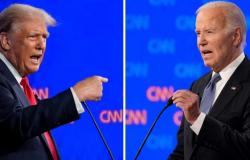ANDThe appointment of Professor Leopoldo Múnera as the new rector of the National University In principle, it aims to put an end to the crisis in the institution that has already lasted for two months. However, according to experts consulted by EL TIEMPO, On the contrary, it would only be a new chapter in a controversy in which university autonomy has been put at stake, which also accentuates the intense power struggle within the most important public university in the country.
And the conditions under which the appointment took place are still controversial. The new majorities in the Higher University Council (CSU), the highest governing body of the university, decided to “correct” what happened in the March 21 session in which José Ismael Peña was appointed as rector, arguing procedural errors and invalidating his appointment, to later reopen, after two months, the voting among the five finalists who aspired to the position, with Múnera being the winner.
However, the decision has been classified as illegal by the other members of the Superior Council, as is the case of the professorial representative Diego Torres, who assured that “what happened at the CSU completely violates due process, the law, it is openly an act framed in prevarication, and disobeys the decisions of justice.”
The Council’s action occurred despite two judicial rulings that confirmed that Peña could not be dismissed or removed from office until the contentious administrative authority, in this case the Council of State, ruled. on the legality of his appointment. Currently there are already guardianships admitted and being studied by the high court on the case.
Sectors that have questioned the decision maintain that legally the CSU could not annul Peña’s appointment and reopen the process since there was an administrative act (in this case the minutes signed by five of the eight members of the body) that confirmed the decision. This despite the refusal of the Minister of Education, Aurora Vergara, in her capacity as president of the Council, to sign said document.
(Also read: ‘The decision of the National CSU is a shame and a crime’: Senator Guido Echeverri after the controversial election of Leopoldo Múnera).
This thesis states that although the president of the CSU did not sign, the minutes were approved and signed by the majorities, so it would be valid. This is how jurist Juan Manuel Charry explains it: “The Council does not have the power to annul its decisions, since this power falls on the administrative litigation judges, so revocation would be illegal.”
However, Maria Alejandra Rojasappointed by President Petro before the Superior Council, pointed out that the decision was made based on article 41 of the Code of Administrative Procedure. “The act was not really issued, it was not signed by the minister or the CSU in full, so the law indicates that it is possible to correct the irregularities that have arisen and adopt the necessary measures to conclude the act.”
In any case, the legal dispute is in the hands of the Council of State, which will now be able to define the legality of Peña’s appointment on March 21, and, if so, it will also be indicating that said administrative act existed or not. With this, it is possible that Múnera’s appointment will be considered illegal and the current former rector will be reinstated in office.
The case of the National University sets a precedent
José Ismael Peña, now former rector of the National University.
Photo:National University
(Also: ‘It is the most serious violation of university autonomy that is known’: Ismael Peña on the decision that removes him as rector of the National University).
But there have also been several events that call into question the actions of the executive: the initial announcement as Government to support the candidate with the most votes in the university consultation, in this case, Leopoldo Múnera; Minister Vergara’s refusal to sign the original minutes; the order (removed by court order) to appoint a rector in charge; the decision to annul the appointment of Professor Peña and the subsequent appointment of Múnera.
Educational analyst Ricardo Rodríguez expressed in this regard: “All this set a disastrous precedent. And it is that the Government directly interferes in the rector election processes, and that it is possible, under far-fetched arguments, to remove or replace rectors. This violates university autonomy. But the most serious thing is that if it happened with the main public university, it can happen with others.”
For his part, analyst Francisco Cajiao, also noted: “If before there were doubts about transparency, now there is less transparency in a move by a Superior Council to which this election did not correspond. The National University has suffered a terrible blow, and the Government has acted in the worst way it could against its most important university in the country.”
One or two constituents?
Tri-state assembly of the National University after the appointment of Ismael Peña as rector.
Photo:Milton Diaz. TIME
However, experts consulted by EL TIEMPO maintain that this is not the only constituent that is being developed in the institution, but that Unal is also being formed as a laboratory for the process proposed by President Gustavo Petro.
This is how the professor at the Pedro Medellín National University explained it to this newspaper at the time: “The Government may be making decisions out of an interest in having its own rector, among other things, to promote its constituent project. This is the most important university in the country and where debates, ideas, proposals spill over to all the others, where other communities can also come together. We must be clear that the social movement that has the greatest capacity for presence and mobilization in the streets are the students.”
MATEO CHACÓN ORDUZ | Education Editorial






